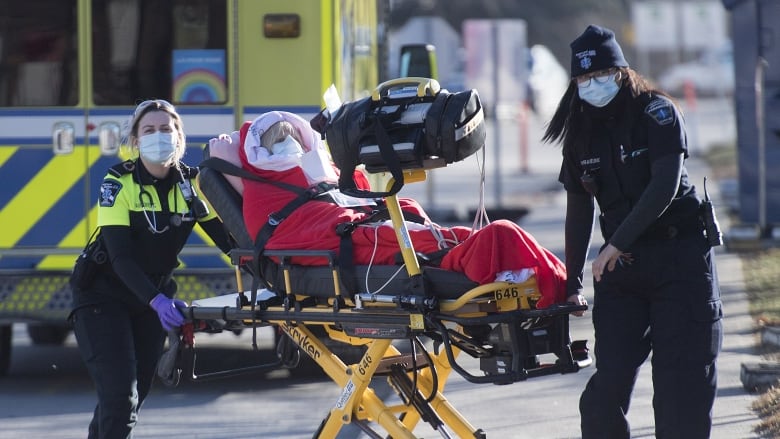COVID-19 is pushing Quebec hospitals to highest alert level. Here's what that means
4 regional health boards have declared a Level-4 alert the highest in the province's contingency plan

For the first time since the start of the pandemic, there are more than 2,000 people with COVID-19 in Quebec hospitals, which are having to delay or cancel medical services in nearly all departments.
With 20,000 workers off the job due to the virus, more and more hospitals in the province are becoming overwhelmed with COVID-19 patients.
The province is now closing some emergency rooms, delaying surgeries and closing several hospital's urgent care departments, such as cardiology and trauma centres, and having patients redirected elsewhere.
Those are the kinds of decisions health boards make after they declare a Level-4 alert the highest in the province's COVID-19 contingency plan.
So far, four regional health boards havedeclared a Level 4 and at least one more region is expected to do so next week, according to Quebec's Health Ministry.
So, what does it mean? And what happens after that?
Whatservices getcut at Level 4?
Most of the province remains in a Level-3 alert, meaning up to half of non-urgent surgeries are being delayed. Thursday, the Health Ministry sent letters to the heads of the province's regional health boards, urging them to delay between 20 and 50 per cent of non-urgent surgeries.
But for those who are now at a Level 4, up to 80 per cent of surgeries could be delayed, including non-urgent and even semi-urgent procedures in nearly all medical-care departments.
Hospitals in the Eastern Townships, the Mauricie and Montrgie-Est have already reached the highestalert level.
Much of the rest of the province, including Montreal, Laval, the Laurentians and the Quebec City region have reached and surpassed the third level.
At Level 4, small, medium-sized and some large emergency rooms can close. People who show up atemergency rooms with issues that are determined to be non-urgent may be referred to a no-appointment clinic.
Paramedics may be required to lend a hand on their arrival at the hospital with a patient, whom they would continue to follow in support of nurses.
Semi-urgent cancer treatments could be postponed. Cardiology departments and trauma centres could be closed in some hospitals, with patients redirected to other regions.
Some births may be transferred to other locations as well.

For example, a low-risk birth could be scheduled in a birthing centre rather than a hospital, or moved to a hospital that has more capacity.
Care after a baby is born could also be transferred to another hospital or region, depending on capacity.
End-of-life care including medical aid in dying willbe provided only in hospital or palliative care centres, rather than at home.
The Health Ministry says it is trying to keep as many mental health services running, "considering the population's growing needs." But evaluations and diagnoses will be done only forurgent cases, and social services will not be holding psychological consultations, referring people instead to Quebec's health-care hotline 811.
Who is affected by the delays?
Dr. Joseph Dahine, an intensive care specialist at Cit-de-la-Sant Hospital in Laval, says hospitals were starting to get busier even before the Omicron variant wave began because of sicker patients, who had been affected by postponed procedures in previous waves.
Dahine says postponing those services puts a serious strain on patients and on the health-care system in the long term.
"We're doing as much as we can with the few resources we have, always thinking about what's safest for the patient, but some compromises have to be made," Dahine said. "We're in very difficult times."
WATCH|ICU doctor expects workload to increase at least "threefold" in coming weeks:
Why is the situation so dire?
Not only has the number of people in hospital with COVID-19 reached a pandemic-high in the province, the total number of health-care workers sidelined by the virus is also growing rapidly.
According to the Health Ministry, about 20,000 workers are absent due to the coronavirus, putting an even heavier strain on hospital services that have been put to the test for nearly two years.
Another 30,000 are on leave either because of burnout or other medical conditions, Health Minister ChristianDub said this week.
That means about 15 per cent of approximately330,000 health-care workers in Quebec are at home.
On Thursday, Dr. Lucie Opatrny, who is Quebec's associate deputy health minister and top hospital official, said regions moving from one alert level to another is "linked to, in part to the weight of COVID, but also the level of absences" in the health network.
"We have weekly meetings, or more frequently if needed, with each CISSS and CIUSSS to better understand their challenges," Opatrny said.
It's important to note that on most days, according toDub, about 40 per cent of people inhospital with COVID-19were initially admitted for other reasons.

The health ministermaintains that those patients nevertheless contribute to the strain that the coronavirus is placingon hospitals.
"We have to treat these people differently," he said. "It complicates the job of our personnel."
Dub also said about 50 per cent of COVID-19 hospitalizations are people who are unvaccinated and that those patients are experiencing more severe symptoms of the disease.
What happens after Level 4?
The province's health-care research institute, known as INESSS, says there could be more than3,400 people in hospitalin two weeks.
Those numbers, the INESSS said, do not take into account the potential effects of the province's latest round of restrictions designed to slow Omicron'sspread. They include delaying children's return to school, closing restaurant dining rooms and bars, and the return of the overnight curfew.
The institute also said, however, that those numbers would put the entire province well above the Level-3 alert level.
Dahine, of Cit-de-la-Sant's intensive care department, says Level 4 implies a certain amount of prioritizing which patient gets what. It involves decisions about who needs surgery or emergency care first.
Dahine says intensive care units are always having to triage who can benefit from ICU beds the most.
"But given the unprecedented rise in COVID cases in hospitals, the game has changed a little bit," he said.
He explained that Level 4 involves a constant reassessment of what services the health-care system can provide, from surgery, to cancer screening, to regular hospital activities.
"The extreme is life or death situations which patient do we prioritize for that last ICU bed?" Dahine said.
"I know it's in the back of the minds of a lot of people, but I think there's still a lot of things we can try to do before we get to that point."
With files from Radio-Canada's Thomas Gerbet and Lauren McCallum














_(720p).jpg)


 OFFICIAL HD MUSIC VIDEO.jpg)
.jpg)



























































































